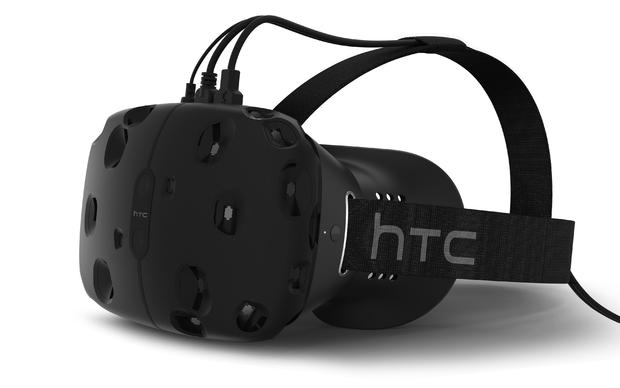HTC looks to virtual reality, gamers as the future
HTC, the Taiwanese smartphone company, has started looking in a new direction for its future: the gaming industry.
The company has formed a strategic partnership with Valve, a company known to PC gamers for its gaming platform and marketplace Steam, and is taking a crack at emerging technology focused on virtual reality.
Formally announced at the beginning of March, HTC and Valve have developed Vive, a virtual reality headset and platform. A developer edition has already been created, with a consumer version scheduled for release by the end of the year.
With Vive, HTC is looking at hardcore gamers as a pathway to the mainstream market.
"We look at it similar to the way we looked at smartphones in the late 90s - as really, the future, " said Jason Mackenzie, president of HTC America. "Gaming is where it will start. Plenty of application for that right away. As soon as you experience it, you will see how it can change the world of education, travel, real estate. There are so many different verticals."
Vive offers immersive, full-room virtual reality with a feature called room scale experience. Sensors included with the headset can be used to mark walls around the area. In virtual reality, those wall boundaries appear as a barrier of sorts for users, alerting them when they're too close.
Mackenzie said the sensors allow users to fully involve themselves in virtual reality regardless of room size.
"We're tuning it so the experience is the same for the New York City apartment and the home in Dallas," Mackenzie said.
Two motion-based controllers are also included, which Mackenzie described as similar to Nintendo's Wiimote, to allow users to better interact with its virtual environment.
Mackenzie said Vive was designed for any gamer looking to experience virtual reality - including the easily dizzy or nauseous. Some people find that virtual reality video can cause something akin to car sickness.
"We haven't had anybody comment that they feel dizzy. Being able to stand up, move around, and being able to interact like you would in real life plays a big part in that," Mackenzie said.
HTC, which just launched the latest in its flagship HTC One smartphone line, is the latest company to throw its hand into virtual reality development. Last year, Facebook announced it had bought Oculus VR, a virtual reality technology company, for $2 billion. A consumer model for the company's flagship headset, the Oculus Rift, could be released this year.
Sony also announced development of its own headset, the Project Morpheus VR system, expected to be released in 2016.
Last December, Samsung released the Samsung Gear VR, a virtual reality device developed in collaboration with Oculus VR. But while Samsung - a company also well known for its smartphones - released its VR device specifically for one of its main smartphone models, the Galaxy Note 4, HTC says Vive is meant for PCs.
"We didn't look at it like, 'Hey let's do virtual reality as a new way to sell more of our phones,'" Mackenzie said. "We looked at it like, 'How can we deliver the best solution to customers who are going to be interested in virtual reality this year?'"
HTC has yet to announce a definitive price for the Vive, with Mackenzie saying, "It's too early to for me tell you," but said that, based on feedback from gamers, content was the bigger concern than cost. He added that HTC has been working on several game developers for content on Vive, and is also talking to other industry leaders in movie and television studios like Lions Gate and HBO. But Valve will be primarily responsible for content development.
"They've got a super strong group of developers and a great reputation in the space that they deliver. So that's helping us take this to a mass market play when this comes to market," Mackenzie said.
HTC and its competitors are putting faith in virtual reality, even after 3D TV and movies failed to grab hold, in part due to clunky glasses, high costs of implementation and a lack of content. Though heavily pushed by television retailers and movie studios as the next step in entertainment, 3D famously fizzled out.
Mackenzie said that the underperformance of 3D television resonated in the development of Vive, and the company placed emphasis on providing a headset that can attract the masses.
"We want [Vive] to be comfortable, usable, and have rich content," Mackenzie said.
Looking beyond the gaming industry, Mackenzie said the potential for virtual reality included more entertainment options as well as a place in the medical and science fields.
But for now, eyeing a release sometime around the holiday season, Mackenzie said HTC is putting its focus on impressing PC gamers looking for something more.
"For myself, I'm not a gamer," Mackenzie said. "But once you actually do the demo and you experience VR, your eyes open up. The world is going to change in the next five to 10 years and VR is going to be a big part of that."
